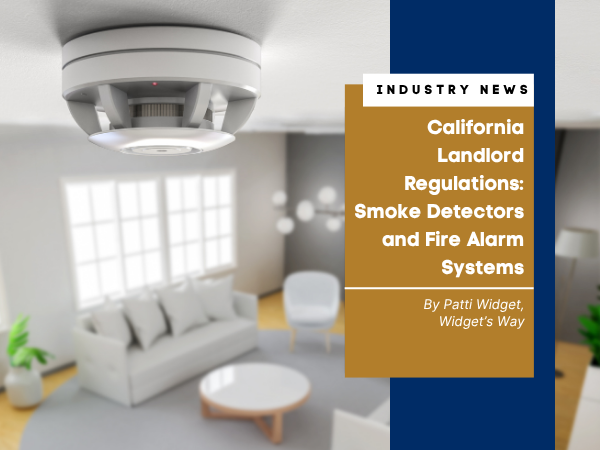California Landlord Regulations: Smoke Detectors and Fire Alarm Systems
California Landlord Regulations: Smoke Detectors and Fire Alarm Systems
By Patti Widget, Widget’s Way
Disclaimer: The information presented in this article is for general informational purposes only and should not be considered as legal advice. Laws and regulations vary, and specific situations may require personalized legal guidance. Please consult a qualified attorney for advice regarding your situation.
Section 310 of the California Building Code requires that all residences and rental properties used for sleeping must have smoke detectors installed. Smoke detector fire alarms must be installed according to the manufacturer’s instructions and must be fully functional and tested on a regular basis to be certain they are working.
Smoke Detector Laws in California
Cal-Fire recommends installing smoke alarms in every bedroom, in the hallways leading to the bedrooms, and on each level of your home, including the basement. Smoke alarms should be mounted on the ceiling 4 inches from the wall; wall mounts should be 4 inches to 12 inches from the ceiling. Do not install near draft areas such as windows or vents.
In California since 2014, new smoke detector fire alarms are required to have a long life and contain a permanently enclosed battery with a 10-year rated lifespan. For older smoke alarms with replaceable batteries, change batteries at least once a year. If the alarm chirps, replace the battery immediately. Test the smoke alarm once a month by pressing the test button. Dust and cobwebs can affect their sensitivity.
California Landlords are also required by law to provide smoke alarms, and tenants cannot remove them. However, it is understood a landlord is limited in their ability to regularly test the smoke alarms which makes it the responsibility of the tenant to test it and replace batteries, when necessary, on older smoke alarms installed before 2014 in California.
In addition to requiring smoke detector fire alarms in California rentals and apartments, the law also requires the installation of approved Carbon Monoxide Detectors in rental properties and single-family dwellings where there is a gas heater or appliance, a fireplace, or an attached garage.
Smoke detector fire alarm systems in apartments and rentals serve many important functions.
Your Tenants are Provided with an Early Warning
Fire alarms are very loud and clear, providing the tenants with a chance to respond quickly, and efforts can also be made to extinguish the fire, which will limit the extent of damage. A proper fire alarm system ensures tenants an early warning, providing them with enough time to vacate the building, and as such, most of the tenants will be able to get out before the fire spreads, and they will be less likely to suffer from any serious injury.
You Will Not Have to Bear Limited Legal Liabilities
A fire alarm system can help you in reducing your potential liability should a tenant sue you for injuries in case of a fire. The prime reason behind this is that there will be a lesser number of injuries since you already have a proper system in place. Secondly, even if you do have to go to court, you can at least claim you did your part, and the entire blame cannot be put on you.
As a California landlord, it is essential that you know the laws regarding smoke detector and fire alarm systems for your apartments and rental property, or you could face steep fines resulting from a building inspection or tenant complaint, or very serious liabilities in the unfortunate event of a fire. Be certain your tenants know and understand their responsibility to test and maintain the smoke detector and fire alarms in their rental units on a regular basis.
Frequently Asked Questions
When does a smoke detector expire in California?
In California, smoke detectors typically have a lifespan of about 10 years. After this time, they may lose their effectiveness and reliability in detecting smoke and fire. It’s recommended to replace smoke detectors every 10 years, or sooner if they are malfunctioning or if the manufacturer specifies a shorter lifespan. Additionally, it’s crucial to regularly test smoke detectors and replace their batteries as needed to ensure they are always functioning properly.
Who is responsible for changing smoke detector batteries in California?
After 2014, landlords are responsible for installing/replacing battery-less smoke detectors every 10 years, or if a malfunction occurs.
Patti Widget teaches a wide range of classes on property management topics. She is a keynote speaker on property management and housing issues and has published numerous articles for apartment associations. She also holds various certifications in the industry related to her field, such as a California licensed Real Estate Broker, CCRM, lead-based paint certified renovator from the Environmental Protection Agency, Fair Housing, and more. For more information, go to www.widgetsway.com.

